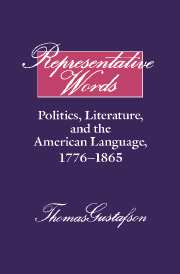Book contents
- Frontmatter
- Contents
- Acknowledgment
- Abbreviations and Editions Cited
- Introduction
- Part I The American Logocracy: The Nexus of Word and Act
- Part II Political and Linguistic Corruption: The Ideological Inheritance
- 3 The Classical Pattern: From the Order of Orpheus to the Chaos of the Thucydidean Momen
- 4 The Christian Typology: From Eden to Babel to Pentecost
- 5 Eloquence, Liberty, and Power: Civic Humanism and the Counter-Renaissance
- 6 The Enlightenment Project: Language Reform and Political Order
- Part III The American Language of Revolution and Constitutional Change
- Part IV From Logomachy to Civil War: The Politics of Language in Post-Revolutionary America
- Afterword
- Notes
- Index
- Cambridge Studies in American Literature and Culture
6 - The Enlightenment Project: Language Reform and Political Order
Published online by Cambridge University Press: 05 January 2012
- Frontmatter
- Contents
- Acknowledgment
- Abbreviations and Editions Cited
- Introduction
- Part I The American Logocracy: The Nexus of Word and Act
- Part II Political and Linguistic Corruption: The Ideological Inheritance
- 3 The Classical Pattern: From the Order of Orpheus to the Chaos of the Thucydidean Momen
- 4 The Christian Typology: From Eden to Babel to Pentecost
- 5 Eloquence, Liberty, and Power: Civic Humanism and the Counter-Renaissance
- 6 The Enlightenment Project: Language Reform and Political Order
- Part III The American Language of Revolution and Constitutional Change
- Part IV From Logomachy to Civil War: The Politics of Language in Post-Revolutionary America
- Afterword
- Notes
- Index
- Cambridge Studies in American Literature and Culture
Summary
… but I leave it to be considered, whether it would not be well for mankind … that the use of words were made plain and direct; and that language, which was given us for the improvement of knowledge and bond of society, should not be employed to darken truth, and unsettle people's rights; to raise mists, and render unintelligible both morality and religion?
John Locke, An Essay Concerning Human UnderstandingLed by Bernard Bailyn, Gordon Wood, and J. G. A. Pocock, scholars of colonial American history have developed the argument (often referred to as the “republican synthesis”) that the ideas, beliefs, fears, and perceptions of the “Commonwealthmen” or “Real Whigs” were “the primary elements of American politics” in the eighteenth century because they formed the political assumptions and expectations of the colonists and furnished “not merely the vocabulary but the grammar of thought, the apparatus by which the world was perceived.” The most important argument of the republican synthesis consists in the claim that the political thought of the Revolution was not primarily rooted in the Lockean tradition of liberalism but in the language of civic humanism developed in the classical and Renaissance city-states and elaborated in the dissenting literature of the English Civil War and in the opposition literature of the eighteenth-century Commonwealthmen. Though the language of republicanism shared the public stage of Revolutionary America with other idioms, the classic texts of the republican tradition provided the colonists with a highly developed discourse for understanding and protesting those actions of a government or the diseases of a state that signified in their minds the advance of corruption against virtue and of tyranny against liberty.
- Type
- Chapter
- Information
- Representative WordsPolitics, Literature, and the American Language, 1776–1865, pp. 137 - 192Publisher: Cambridge University PressPrint publication year: 1993



